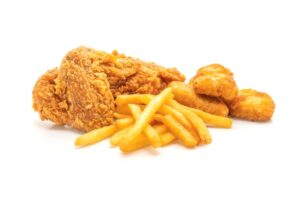What Foods Should You Avoid with Calcific Tendonitis?
June 15, 2024

Calcific tendonitis is a potentially painful condition that occurs when calcium deposits build up on the tendons, which can interfere with joint mobility and cause intense soreness. Often, the exact cause of calcific tendonitis is unknown, although aging, accidents, and genetic predisposition may all be contributors. Many experts also believe that diet can play a role. What foods should you avoid if you have calcific tendonitis or want to reduce your risk of developing it? This blog post provides some suggestions. It also provides other helpful tips for fighting calcific tendonitis.
What Should You Not Eat if You Have Calcific Tendonitis?
For anyone with calcific tendonitis (really, anyone who wants to enjoy optimum health), it is best to avoid foods that contribute to inflammation throughout the body. Such foods include:
- Highly processed foods. Many snack foods, as well as some deli meats and popular beverages, fall into this category. They often contain high levels of salt, sugar, or additives that interfere with the human body’s ability to function at its best.
- Friend foods. Sadly, lots of popular fried foods, such as chicken nuggets, French fries, and classic fried chicken, can contribute to chronic inflammation. They can also play a role in joint pain and calcific tendonitis.
- Sugary foods. Foods with high levels of added sugar are known to contribute to inflammation, weight gain, joint issues, and many other problems. Sugary drinks, candies, cakes, and even many types of yogurt and juice, are not ideal for individuals with calcific tendonitis.
What Should You Eat if You Have Calcific Tendonitis?
Try to center your diet on foods that are known to have anti-inflammatory effects, including:
- Dark leafy greens, such as kale and Bok choy
- Lean proteins
- Bone broth
- Foods that are rich in vitamin C, such as broccoli, squash, and citrus fruits
- Foods with a lot of zinc, including beans, whole grains, and pumpkin seeds
Other Ways to Manage Calcific Tendonitis
Dietary changes have the potential to help you reduce or prevent calcific tendonitis symptoms. However, there is more you can do. If your symptoms are interfering with your daily life, see a doctor for care.
There are a number of treatments that might be able to help. Often, a minimally invasive procedure known as barbotage is very effective. It involves the use of a precisely inserted needle that breaks up calcium deposits on the tendons. It is sometimes able to help patients with severe symptoms avoid the need for surgery.
Your diet can play a big role in your musculoskeletal health! Try to make wise eating choices so you can feel and function as well as possible.
Meet the Practice
Here at the Institute for Non-Surgical Orthopedics, we are proud to provide a broad range of treatments for many different conditions. Barbotage for calcific tendonitis is among the services we offer. If you believe you are suffering from this condition, we are ready to evaluate your situation and provide our professional recommendation on your next steps. To learn more about how we may be able to serve you, contact our Fort Lauderdale office at 954-563-2707.
No Comments
No comments yet.
RSS feed for comments on this post.
Sorry, the comment form is closed at this time.









